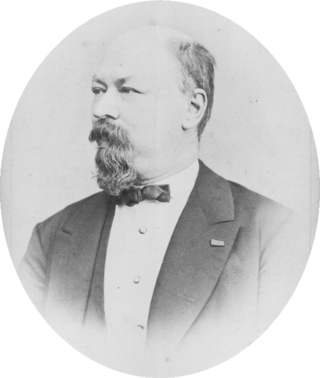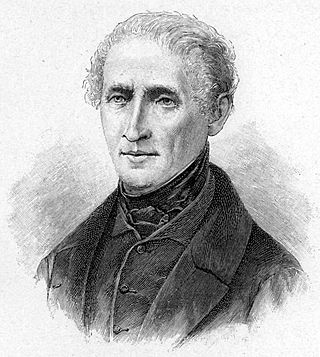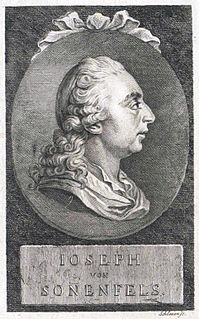Related Research Articles

The Codex Manesse is a Liederhandschrift, the single most comprehensive source of Middle High German Minnesang poetry, written and illustrated between c. 1304 when the main part was completed, and c. 1340 with the addenda.

Walther von der Vogelweide was a Minnesänger who composed and performed love-songs and political songs ("Sprüche") in Middle High German. Walther has been described as the greatest German lyrical poet before Goethe; his hundred or so love-songs are widely regarded as the pinnacle of Minnesang, the medieval German love lyric, and his innovations breathed new life into the tradition of courtly love. He was also the first political poet to write in German, with a considerable body of encomium, satire, invective, and moralising.

Franz von Suppé was an Austrian composer of light operas and other theatre music. He came from the Kingdom of Dalmatia, Austro-Hungarian Empire. A composer and conductor of the Romantic period, he is notable for his four dozen operettas.

Joseph Freiherr von Eichendorff was a German poet, novelist, playwright, literary critic, translator, and anthologist. Eichendorff was one of the major writers and critics of Romanticism. Ever since their publication and up to the present day, some of his works have been very popular in Germany.

Karl Christian Friedrich Krause was a German philosopher whose doctrines became known as Krausism. Krausism, when considered in its totality as a complete, stand-alone philosophical system, had only a small following in Germany, France, and Belgium, in contradistinction to certain other philosophical systems that had a much larger following in Europe at that time. However, Krausism became very popular and influential in Restoration Spain not as a complete, comprehensive philosophical system per se, but as a broad cultural movement. In Spain, Krausism was known as "Krausismo", and Krausists were known as "Krausistas". Outside of Spain, the Spanish Krausist cultural movement was referred to as Spanish Krausism.

Karl Hermann Johannes Thiele was a German zoologist specialized in malacology. Thiele was born in Goldap, East Prussia. His Handbuch der systematischen Weichtierkunde is a standard work. From 1904 until his retirement in 1925 he was the curator of the malacological collection at the Museum für Naturkunde in Berlin. Thiele described more than 1.500 new species of molluscs; until today their types are deposited with the Museum of Natural History in Berlin. Especially important are his works on the Mollusca of the First German Antarctica Expedition and of the German Deep Sea Expedition aboard the vessel Valdivia.

Johann Christian Daniel von Schreber, often styled J.C.D. von Schreber, was a German naturalist.

East Franconian or Mainfränkisch, usually referred to as Franconian in German, is a dialect which is spoken in Franconia, the northern part of the federal state of Bavaria and other areas in Germany around Nuremberg, Bamberg, Coburg, Würzburg, Hof, Bayreuth, Meiningen, Bad Mergentheim, and Crailsheim. The major subgroups are Unterostfränkisch, Oberostfränkisch and Südostfränkisch.

The Felinae are a subfamily of the family Felidae. This subfamily comprises the small cats having a bony hyoid, because of which they are able to purr but not roar.

Ursula Gertrud von der Leyen is a German politician who has been serving as the president of the European Commission since 2019. She served in the German federal government between 2005 and 2019, holding successive positions in Angela Merkel's cabinet, most recently as Minister of Defence. Von der Leyen is a member of the centre-right Christian Democratic Union (CDU) and its EU counterpart, the European People's Party (EPP).
The Reed reaction is a chemical reaction that utilizes light to oxidize hydrocarbons to alkylsulfonyl chlorides. This reaction is employed in modifying polyethylene to give chlorosulfonated polyethylene (CSPE), which noted for its toughness.

The Grand Master of the Teutonic Order is the supreme head of the Teutonic Order. It is equivalent to the grand master of other military orders and the superior general in non-military Roman Catholic religious orders. Hochmeister, literally "high master", is only used in reference to the Teutonic Order, as Großmeister is used in German to refer to the leaders of other orders of knighthood.
Die Fragmente der griechischen Historiker, commonly abbreviated FGrHist or FGrH, is a collection by Felix Jacoby of the works of those ancient Greek historians whose works have been lost, but of which we have citations, extracts or summaries. It is mainly founded on Karl Wilhelm Ludwig Müller's previous Fragmenta Historicorum Graecorum (1841–1870).

Dietmar von Aist was a Minnesinger from a baronial family in the Duchy of Austria, whose work is representative of the lyric poetry in the Danube region.
The Deutscher Jugendliteraturpreis is an annual award established in 1956 by the Federal Ministry of Family Affairs, Senior Citizens, Women and Youth to recognise outstanding works of children's and young adult literature. It is Germany's only state-funded literary award. In the past, authors from many countries have been recognised, including non-German speakers.

Joseph Freiherr von Sonnenfels was an Austrian and German jurist and novelist. He was among the leaders of the Illuminati movement in Austria, and a close friend and patron of Mozart. He is also the dedicatee of Ludwig van Beethoven's Piano Sonata No. 15, Op. 28, which was published in 1801.

Friedrich Christian Delius, also known by his pen name F.C. Delius, was a German novelist. He wrote books about historic events, such as the 1954 FIFA World Cup, and RAF terrorism. Four of his novels were translated into English, including The Pears of Ribbeck and Portrait of the Mother as a Young Woman. His awards include the Georg Büchner Prize of 2011.

The House Order of Fidelity is a dynastic order of the Margraviate of Baden. It was established by Charles III William, Margrave of Baden-Durlach as a reward for merit and to mark the laying of the foundation stone of his residence at Karlsruhe Palace. As was customary at that time, it was originally named in French as the Ordre de la Fidélité, before later being renamed the Orden der Treue and finally in 1840 the Hausorden der Treue. Its motto was Fidelitas, which is also part of Karlsruhe's coat of arms.
References
- Heer, O. 1847: Die Insektenfauna der Tertiärgebilde von Oeningen und von Radoboj in Croatien. Erste Abtheilung: Käfer. Neue Denkschriften der Allgemeinen schweizerischen Gesellschaft für die gesammten Naturwissenschaften, 8: 1-229 + index + 8 pl. [separately paginated].
- Alonso-Zarazaga, M.A.; Lyal, C.H.C. 1999: A world catalogue of families and genera of Curculionoidea (Insecta: Coleoptera) (excepting Scolytidae and Platypodidae). Entomopraxis, Barcelona.